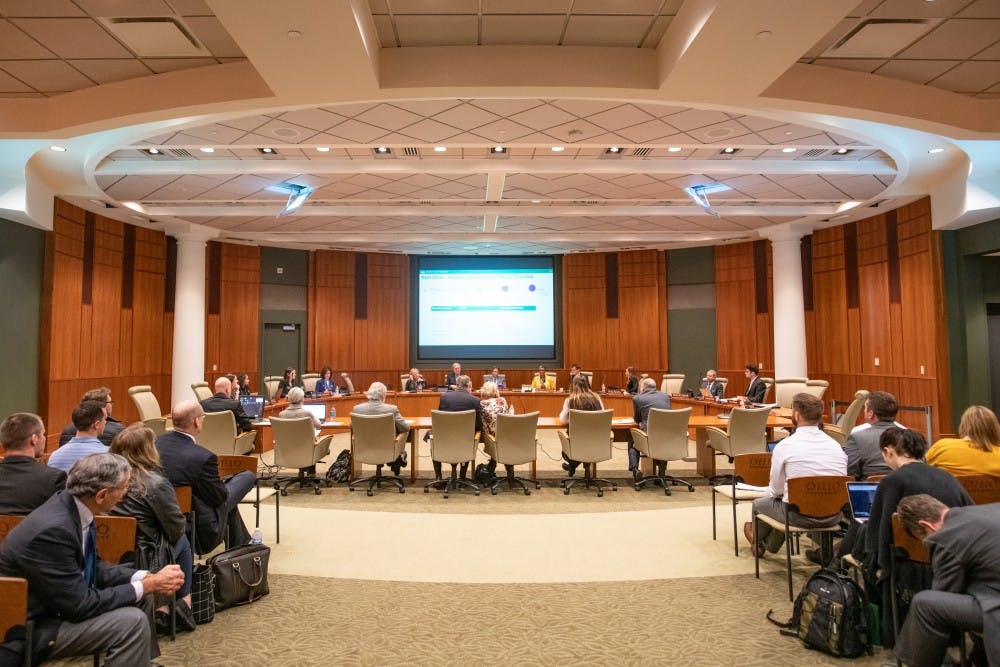The Ohio University Board of Trustees met Thursday and Friday amongst a faculty-led silent protest to discuss the university’s “strong” financial position.
During Friday’s main board meeting, the Ohio University chapter of the American Association of University Professors, or AAUP, led a silent protest against what they see as a lack of faculty input in the current conversation about the university cutting faculty, according to a previous Post report.
AAUP President and professor of classics, Loren Lybarger, said one of the goals of the protest was to make the Board aware that faculty are concerned about possible cuts and want to be included in budget conversations moving forward.
During the media availability meeting later the same day, Board Chair Dave Scholl said OU is doing alright financially. Outside factors, such as falling enrollment, are forcing the university to reconsider how it can better position itself to remain sustainable and competitive in the realm of higher education, he said.
A budget crisis starts when the university stops innovating fiscally, Deb Shaffer, senior vice president for finance and administration, said on Thursday during the Interrelated Strategic Agenda Update.
Currently, OU has about $1 billion, Shaffer said. Not all of that money is at the university’s disposal, however, as some is held in bonds or restricted in other forms.
The university earned about $10 million more than expected this fiscal year, but still is down about $6.8 million in net tuition on the Athens campus alone. There was also about $2.5 million more in expenses than expected in 2019.
The Board also approved the planning and construction of six different projects across its campuses at the Resources, Facilities and Affordability Committee meeting on Thursday.
OU President Duane Nellis expressed his support for the approval of constructing an eSports facility in Scripps Hall.
“It really is a multi-dimensional facility that spans across the university,” Nellis said. “From the general humanities, business, to engineering, it’s really important stuff moving forward.”
The facility will be on the ground floor of Scripps and is estimated to cost about $650,000. It will include a competition room, a club practice room, a social gaming area, an office space and a broadcasting booth.
Five other projects that span across the Lancaster, Dublin and Chillicothe campuses were also approved. About 75% of all the projects are funded in part through federal or state grants, Trustee Steve Casciani said.
The Board also had conversations about how it plans to make its campus safer.
One goal is to eliminate hazing on OU campuses. By doing this, the Board hopes to create a more positive experience for all OU students.
The Board said it is taking proactive steps to eliminate both hazing and sexual assault, but no specific plans were mentioned during the Main Board meeting.
During the Governance and Compensation Committee meeting, the Board clarified parts of its sexual misconduct standards. The conversation was prompted by Michigan State’s recent lawsuit in which its Board of Trustees’ interim president was forced to step down.
In cases of student-on-student sexual misconduct, the university is not held liable. That policy does not change unless the university is made aware of the misconduct and disregards it.
The Board also reviewed its sustainability and climate action plan and proposed revisions to the plan.
OU first made its climate action plan in 2012. In the original plan, the goal was for OU to be carbon neutral by 2075. The new proposed deadline is by 2050 in order to minimize the university’s impact on the climate.
The university will attempt to be carbon neutral before that deadline.
OU has 32 sustainability goals and 16 thematic areas of sustainability that it focuses on. Some of its top priorities are climate, curriculum, buildings and investment.
The Board also announced that a new Heritage College of Osteopathic Medicine building will be named Heritage Hall.
Heritage Hall will be a medical education building at 191 W. Union St. The university has recently received three gifts for the building’s construction that are all at least six figures.
Scholl expressed his excitement for the project and how it is a great project in the eyes of alumni.
“This is going to be the most energizing for alumni … that we are building for the future,” Scholl said. It’s encouraging.”






